Brecht’s Galileo explores science’s contemporary dilemmas
Book Review: The epic play’s messages remain relevant nearly eight decades later.
Book Review: The epic play’s messages remain relevant nearly eight decades later.
No self-respecting theatrical producer is likely to pass up on the opportunity to exploit contemporary relevance in any classic play.
That was certainly the case with the Auckland Theatre Company (ATC), which has just finished a season of Bertolt Brecht’s The Life of Galileo, perhaps the leading didactic drama of its time.
Director Colin McColl cites the underlying themes of a scientist’s responsibility to humankind, the conflict between blind faith and reason, and the containment and dispersal of scientific knowledge. He adds that state authorities have in recent years tended to ignore scientific evidence, a reference to climate change and the Covid-19 pandemic.
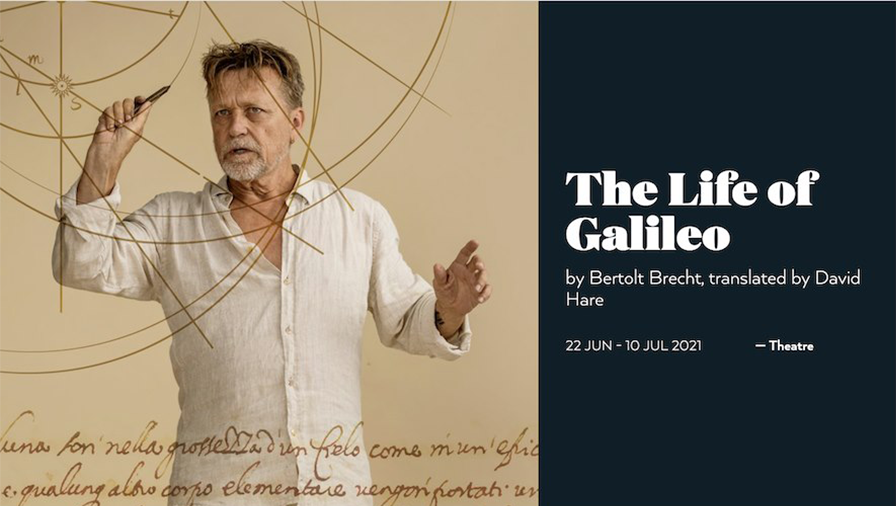
Some might add other controversies, such as the cancel culture that shuts down dissident opinions, and ideologies that cling to non-scientific cosmology. Staring at the night sky – or more accurately, early morning – is de rigueur now that Matariki is to become a public holiday.
For Polynesians, like the ancient Greeks before them, the movements of the planets and stars provided an explanation of the Creation, as well as being useful for navigating across open seas or predicting the future. But without telescopes and other instruments, they were dependent only on what they could see.
According to Polynesian tradition, the stars were conceived as beings, who were bound together as a family through a hierarchical structure (A Review of Maori Astronomy, 2013).
The Greeks knew the ‘seven heavenly sisters’ of Matariki as the Pleiades. Most civilisations recognised their existence, including the Japanese, who called them Subaru. The logo of the eponymous car manufacturer has six stars.
In Europe, the cosmology of the ancient Greeks and Romans lasted until the mid-16th century, when Copernicus created a new model of the universe that inverted the notion that Earth was at its centre.
The Roman Catholic Church continued to back the heliocentric model of the Egyptian astronomer Ptolemy, who had the sun, moon, planets and stars orbiting Earth. Earlier, mythology held to a flat Earth explanation.
Galileo’s discoveries
Galileo Galilei – an Italian polymath with an interest in engineering and physics as well as astronomy – expanded Copernicus’s work. By 1610, Galileo had established that Earth and the moon were alike, as they both reflected light from the sun. He was able to do this with his own advanced version of a Dutch invention, the telescope.
He also found the so-called morning star, Venus, was another planet and that Jupiter had four moons. Such discoveries challenged the Church’s adherence to the Ptolemaic model, resulting in Galileo’s first inquisition in 1615.
Brecht’s drama opens with Galileo explaining Copernicus’s findings to Andrea Sarti, his housekeeper’s son. These theories are then elaborated to a representative of Padua university where Galileo was employed as a maths teacher.
His subversion of religion’s monopoly on knowledge is a fight for truth and reason. He speaks favourably of trade as a generator of wealth, and that ideas can do the same. He is also under pressure, as an inventor, to ensure his research has practical value.
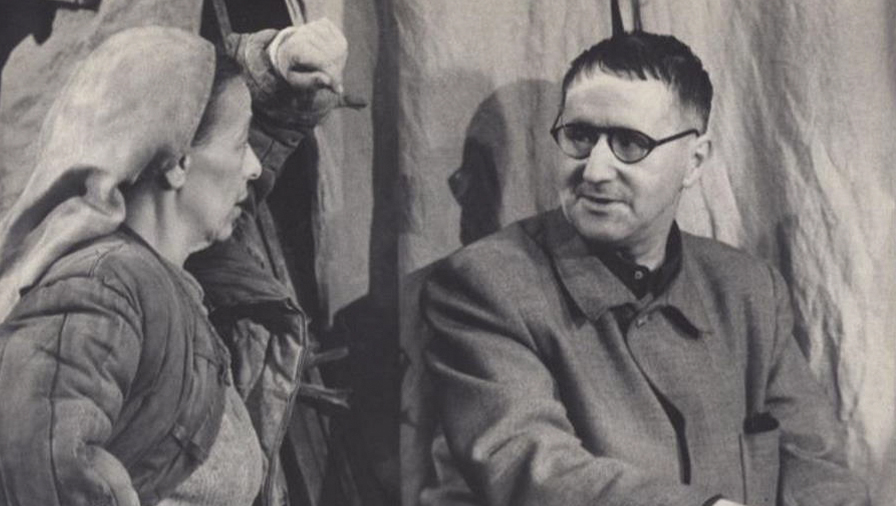
Brecht’s purpose
Brecht wasn’t the first dramatist to preach to his audiences, but they were lapping him up after his success with The Threepenny Opera, for which composer Kurt Weill provided the music. Their work was suppressed after Hitler came to power in 1933. The Threepenny Opera had been performed 4000 times in 120 theatres in Germany alone since it opened in 1928.
Overnight, Brecht – like most of Weimar Germany’s socialist and Jewish artists – lost their incomes and sought refuge elsewhere. He and his coterie of female collaborators (including actress-wife Helene Weigel, Elisabeth Hauptmann, Margarete Steffin, and Ruth Berlau) spent time in Switzerland and France before moving to Denmark. In 1941, the Brechts eventually settled in California, travelling via Moscow and Vladivostok just before Hitler attacked the Soviet Union.
Brecht finished the first draft of Galileo in November 1938 while in Copenhagen. It was informed by a meeting with atomic physicist Niels Bohr, who was working on splitting the atom and the eventual nuclear bomb. This version, in German, was first performed in Zurich in 1943, by which time Brecht was living in Hollywood.
There, he began a second version, in English as well as German, with input from actor Charles Laughton and then-stage director Joseph Losey, later to become famous for his films (Losey’s video production with Topol in 1975 is on YouTube).
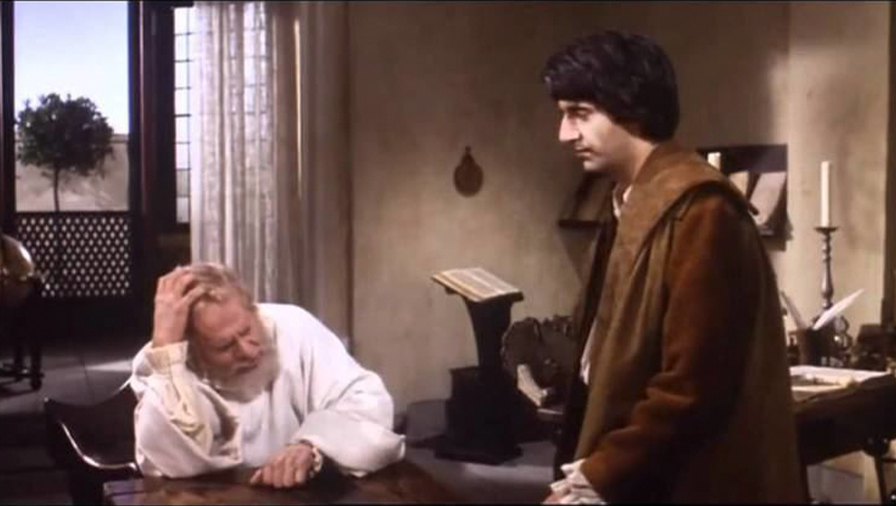
Different versions
The different versions of Galileo reflect Brecht’s own thinking about theatre as well as the changing political landscape. His work with Weill aimed to challenge elite classical opera and imbue musical theatre with a political message.
Galileo championed the notion that science be accessible to ordinary people and not dictated by authority. Brecht’s prolific output, such as The Caucasian Chalk Circle, The Good Woman of Szechuan, and Mother Courage and Her Children, were similarly ideological.
While his minimalist approach to dramatic effects made them easy to stage, the long dialogues were not audience friendly. Actors were encouraged to avoid empathy and to “alienate” those watching. In many ways, these dramas are easier to experience as books than in a theatre; Germans call this a Lehrstück, or a play for reading.
The staging by the ATC ran for nearly three hours, making Galileo an epic in anyone’s language. It benefits from being read afterward. (The ATC used David Hare’s translation. Methuen published the original translation by Desmond Vesey, and issued a more recent one by John Willett with the Laughton/Losey version as an appendix. Both editions contain Brecht’s notes.)
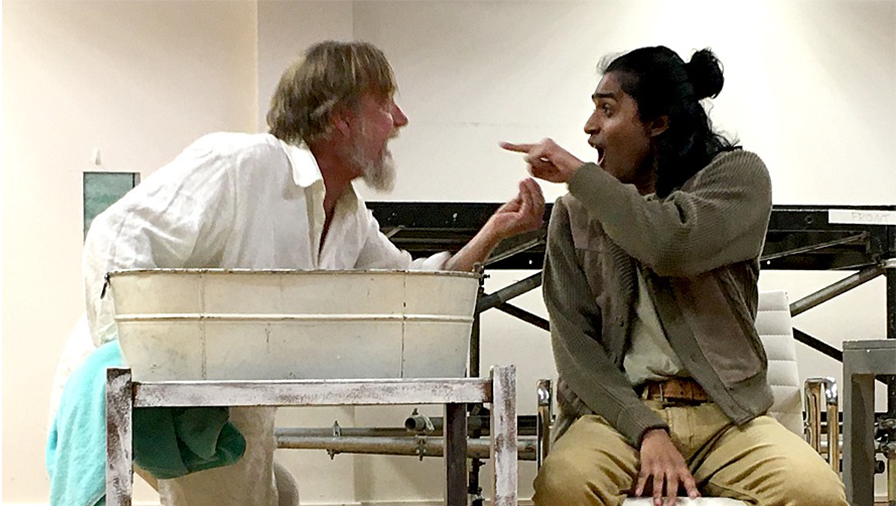
Reading the scripts makes it easier to appreciate the finer points missed in the streams of dialogue, such as Galileo saying: “Truth is the child of time, not authority.” Telling the sceptical Little Monk, Fulgenzie, that poverty is not a reason to believe in God: “There is no meaning in our misery, hunger is simply not-having-eaten, and not a test of strength; exertion is just stooping and tugging – with nothing to show.” Or challenging the status quo: “No hugging the coast, sometime you must put out to sea.”
Brecht’s politics
Brecht’s six years in the US were not as successful or productive as his earlier period in exile. But Weill was welcomed by Broadway, where he composed non-political musicals that also enabled his wife, Lotte Lenya, to resume her singing and acting career.
Meanwhile, Brecht struggled without English to establish a reputation in Hollywood and was averse to working again with Weill, though they continued to stage productions of The Threepenny Opera and The Rise and Fall of Mahagonny.
Their relationship, as well as those of Weigel, Lenya, Hauptman, and Brecht’s many mistresses, is the subject of The Partnership, by screenwriter Pamela Katz (Rosenstrasse, Hannah Arendt).
Brecht and Weigel returned to Germany in 1947 to escape the McCarthyite anti-communist inquiry into Hollywood and settled in East Berlin. There, they ran the communist government’s leading cultural attraction, the Berliner Ensemble. His days as a playwright were over.
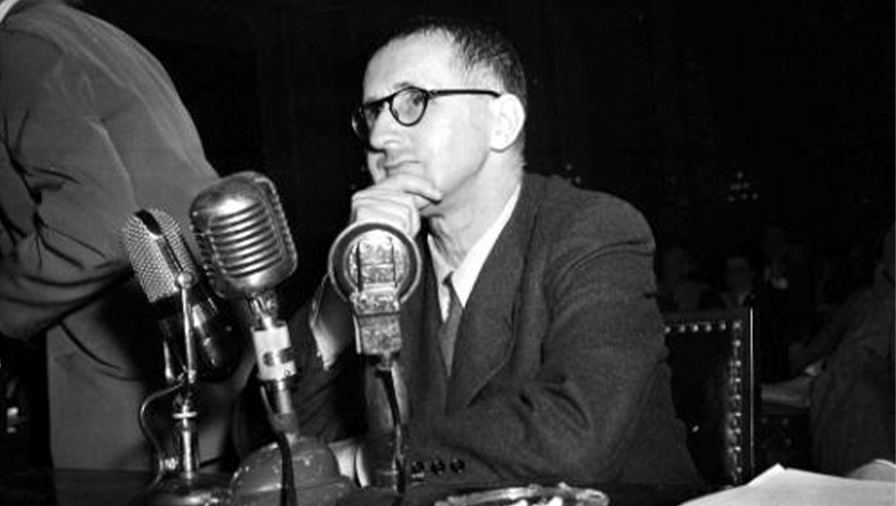
Though a strict adherent to Marxism, Brecht did not like to defer to authority or to anyone else. This side of his personality gave yet another interpretation of Galileo’s tension with the Vatican.
Galileo and the Vatican
Eight years after the first inquisition, which resulted in Galileo giving up astronomy, he resumed his research into sunspots, which continued to fascinate scientists. The scientific world had moved on but Galileo’s reputation remained high throughout Europe.
He sees hope of change under a new Pope, the former Cardinal Barberini, who earlier in the play had backed Galileo. The inquisition resumes in 1633, but not before a supportive Venetian businessman, Vanni, extols the benefits of freedom to innovate and make money, virtues Marx had expressed as progressive features in capitalism. Italian churches opposed the factories in northern Europe on grounds they encouraged immorality.
As Pope Urban VIII, Barberini agrees with the Inquisitor to spare Galileo from torture, enabling him to “recant” and spend the rest of his life to 1642 under virtual house arrest. However, Galileo secretly works on his study of motion, Discoursi, which is smuggled out of Italy in the final scene.
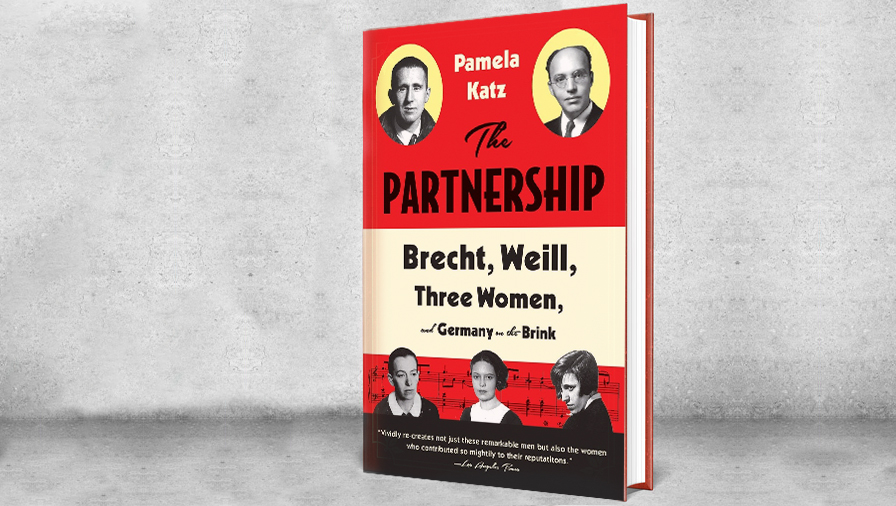
Recantation excused
Brecht was familiar with the forced recantation of dissident communists under Stalinist practice, giving Galileo a different slant when performed for East Germans than for those in the west. Parallels with the cancel culture of today do not go unnoticed in the ATC production.
In the play, Galileo defends his cowardly compromise, “better to be tainted than empty,” in explaining to the now-adult Sarti why he did not martyr himself. He had a liking for the good life and was not going to give that up.
In the Vesey translation, Galileo says the science of doubt frees people from the captivity of princes, landlords and priests to the “nacreous haze of superstition”. He laments to Sarti that he didn’t do more to resist authority: “The only purpose of science is to ease the hardship of human existence.”
Until his death in 1956, Brecht enjoyed high status and relative wealth in East Germany, while remaining as much a victim and beneficiary as Galileo in succumbing to systems they accepted.
The Life of Galileo (Leben des Galilei), by Bertolt Brecht. Translations by Desmond Vesey (Methuen, 1960), John Willett and Charles Laughton (Bloomsbury).
The Partnership: Brecht, Weill, three women, and Germany on the brink, by Pamela Katz (Anchor/Penguin Random House).
Nevil Gibson is a former editor at large for NBR. He has contributed film and book reviews to various publications.
This is supplied content and not paid for by NBR.
Sign up to get the latest stories and insights delivered to your inbox – free, every day.